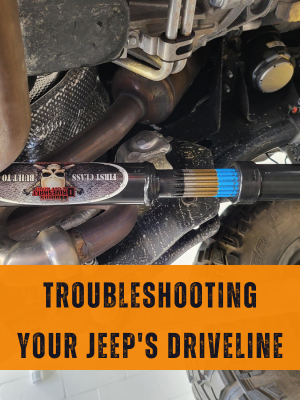
Understanding Jeep Driveshafts and the Ideal Time for an Upgrade
If you're a Jeep enthusiast, you know that adding larger tires and a lift kit can enhance your off-roading experience. However, these modifications can also put additional stress on your Jeep's driveshaft, leading to potential failure and costly repairs.
So, when should you upgrade your Jeep's driveshaft? Here are some factors to consider:
Lift Kits
When you install a lift kit, it changes the suspension geometry of your Jeep, which can cause issues with the factory driveshaft. This is especially true if you're adding a lift kit of 2.5 inches or higher. Upgraded aftermarket driveshafts have the extra length and strength needed to accommodate these changes and prevent damage.
Engine Power
If you're increasing your Jeep's horsepower with superchargers or turbo systems, your factory driveshaft may not be able to handle the extra power. This can lead to wear and tear and eventually failure.
Larger Tires
Adding larger tires requires more initial torque to turn, which can put a strain on your factory driveshaft. A stronger aftermarket driveshaft can handle the extra power needed to turn those bigger tires.
Maintenance and Inspection
Even if you haven't made any modifications to your Jeep, it's important to inspect your factory driveshaft regularly, especially on higher mileage vehicles. Over time, the rubber casings can tear, and the u-joints can become damaged. Unfortunately, many factory driveshafts have little to no provisions for lubrication, so there isn't much to be done to prevent them from wearing out.
When it comes to upgrading your Jeep's driveshaft, there are several options to consider. For JK Wrangler owners, 1310- and 1330-sized u-joint shafts are solid, standard kits, followed by the beefier 1350. YJ and TJ applications utilize a 1310 u-joint size for non-Rubicon models while 1330 is used for Rubicon models. Additionally, for those planning on lifting their Jeep 4" or more, there are CV (constant velocity) driveshaft upgrades available. These also require converting to a slip yoke eliminator kit.
Most owners looking to upgrade their Jeep driveshaft will be best served by ones that utilize either 1310 or 1350 u-joints, as these are more than adequate in an aftermarket shaft for anyone running up to a 37" tire. While some do convert to a 1350 u-joint driveshaft because of the extra strength, this could also be a drawback should that shaft break. This is because most people you'll meet on trail rides utilize a 1310, and will most likely carry replacements for that style, so it will be easier to get yourself fixed up. However, if you plan on more intense rock crawling, and are running larger 40" tires with high-end Dana 60 axles, then the stronger 1350 u-joint shafts are absolutely worthwhile.


